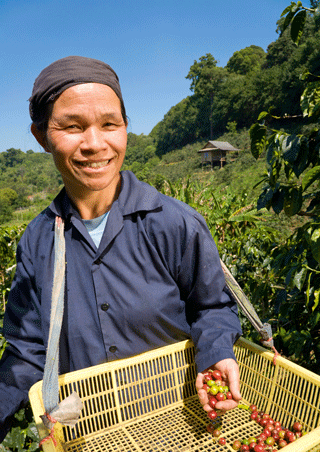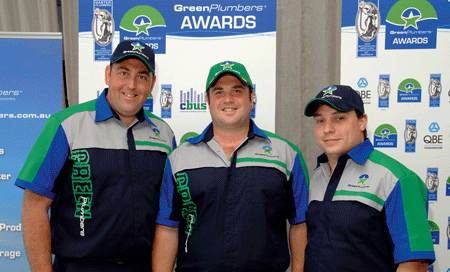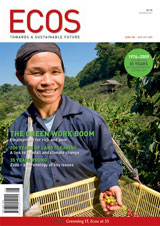
|
Published:
Green work boom collars the international market
The burgeoning environmental industry is giving rise to an international-scale employment transformation. With it comes a wealth of opportunity for lower socio-economic workers both at home and abroad, and the promise of workplace evolution for most, but the fast change must be carefully managed.
Burkina Faso’s first plastic recycling centre is an example of a new type of development project – designed to link job creation to a cleaner and more sustainable environment. The centre in the capital Ouagadougou provides an income to 30 poor local women and helps to control the 20 000 tons of plastic waste scattered around the city each year. Even here, in a country where livelihoods and resources are meagre, the environmental cause is transforming lives through new problem-solving opportunities.
A 2008 report1 by the International Labour Organization (ILO) provides examples of the massive green jobs creation occurring throughout the world, including 600 000 people in China already employed in making and installing solar thermal products; a biofuels industry in Nigeria based on cassava and sugar cane crops with potential to employ 200 000 people; 900 000 jobs in India by 2025 in biomass gasification; and in South Africa, 25 000 previously unemployed people now employed in conservation as part of the ‘Working for Water’ initiative.
It is generally good news for developing countries – environmental jobs improve the quality of life. In the ILO report the United Nations Environment Program defines green jobs as ‘work in agricultural, manufacturing, research and development, administrative and service activities that contribute substantially to preserving or restoring environmental quality’.
Aside from domestic problem-solving needs, much of the work incentive in developing countries is increasingly coming from both the growing demand for ‘sustainable’ products and services in developed countries, as well as direct investments in internationally accredited environmental development projects, such as those under the UN’s Clean Development Mechanism.2
In Australia and New Zealand, according to a report by Connection Research for the Environment Institute of Australia and New Zealand (EIANZ) and the NSW Department of Environment and Climate Change, estimates of the number of green jobs or green collar workers vary from less than 50 000 to more than 300 000, depending on what definitions are used.
NSW President of the EIANZ, Tom Davies, says the change in the institute’s membership over the past five years reflects the growth in green occupations – from its traditional base of government workers and consultants, members now include bankers, environmental lawyers and recruitment consultants.
According to the EIANZ report, green jobs could include electrical engineers working for power companies, construction workers building a solar power facility, lawyers specialising in environmental issues and dairy farmers struggling with reduced water allocations – as well as, say, journalists writing about environmental issues.
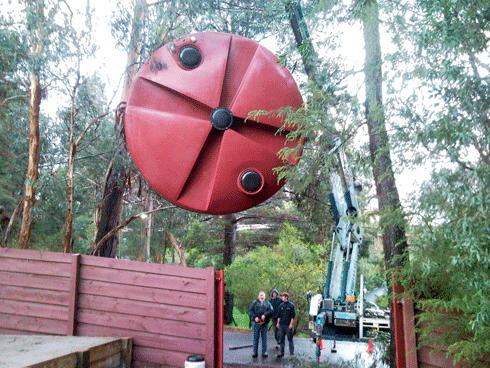
|
|
Significant increases in wind power infrastructure development across the world has resulted in multiple international layers of associated job roles across this industry alone. Credit: iStockphoto
|
Davies says the workforce is in a transitional phase. ‘It’s at a similar stage to where health and safety was 20 years ago, with the corporate environmental manager now sitting alongside the marketing manager or the financial manager.’
‘While we are in the transitional phase there is a role for individuals who are helping adapt from the old model of unlimited economic growth to a more constrained model.’
A recent CSIRO report, ‘Growing the green collar economy’, commissioned by the Dusseldorf Skills Forum, confirms that moving to a low carbon economy will require a ‘green skills’ revolution in the Australian workforce.
CSIRO senior research leader, Dr Heinz Schandl, said achieving the shift will require a massive mobilisation of skills and training for green collar workers, but that so far this skills transition has been largely ignored.
Likewise, Environment Victoria Campaigns Director Mark Wakeham believes Australia has been slow to embrace green jobs.
‘It takes some leadership from government to create the demand for the industries – particularly for “dark green” industries, such as renewable energy, energy efficiency and home audits,’ he said.
‘Once you have created the driver you have to ensure you have the rollout of skills to match.’
That said, in the recent federal budget, green jobs creation is a part by-product of significant new investments and incentives developed for infrastructure, industry and domestic sustainability initiatives, and research. Arguably the next need is for wider skills training.
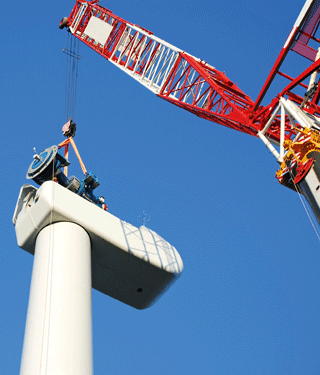
|
|
A team from Sustainable Plumbing Solutions installing rainwater tanks in a challenging location. Credit: Sustainable Plumbing Solutions
|
But as well as new industries, green jobs will also come from greening of existing industries and evolve from existing roles. ‘For example, a purchasing officer in a large company who manages energy and stationery contracts has the ability to make a large difference through their purchasing decisions,’ said Mr Wakeham. Environment Victoria proposes rail manufacturing as an industry with great potential to provide green jobs in Victoria.
Mr Wakeham believes Australia is lagging behind other countries and although we have some green industries, they are ‘pockets of green in a sea of brown’.
He emphasised the importance of protecting these existing green industries, such as waste recycling which he said was in danger of collapse due to falling commodity prices.
‘If we want to make green jobs mainstream we need to be developing much more ambitious policies around greenhouse gas emission reduction. If you look at the pace of change compared with what’s been happening in Europe, we’ve got a long way to go,’ he said.
The Brotherhood of St Laurence says any green jobs must have a third goal beyond the economy and the environment – helping the poor.
Damian Sullivan, manager of The Brotherhood’s equity in response to climate change program, said disadvantaged and long-term unemployed people must be involved in Australia’s responses to climate.
‘The biggest benefit of green jobs is that they will be a growth area in Australia. For disadvantaged Australians the most important green jobs will occur in low–medium skilled employment with pathways to improve skills and future employment and earning potential,’ he said.
The Workplace Research Centre in Sydney is taking part in the ILO’s ‘Green Jobs Initiative’ on an international study to identify green skills and where they will be needed.
Research analyst at the centre, Serena Yu, said the ILO had commissioned reports from a number of countries, including Australia, from which they will pick the best 12.
‘We will be classifying green jobs and green skills to identify which occupations and industries are considered green jobs,’ said Ms Wu.
‘We’ll also be looking at occupations and industries which will be displaced by the new climate change/sustainability agenda.’ Any rebound effects from such a boom need to be identified and managed.
Education providers, meanwhile, are finding a demand for their skills in areas where green industries are already established. In the lead-up to a national emissions trading scheme, Swinburne University of Technology’s National Centre for Sustainability has been overwhelmed by demand for its course in carbon accounting (Australia’s first accredited carbon accounting course). Last year, eight groups of 16 completed the course and this year another 14 groups have been fully signed up.
The centre’s team leader for business and community sustainability, Scott McKenry, said many of the participants were consultants who wanted accreditation, as well as people from emissions-intensive industries and local councils, many of which would have potential liabilities under an emissions trading scheme.
More information:
CSIRO (2008) Growing the green collar economy. www.csiro.au/resources/GreenCollarReport.html
ACTU and Australian Conservation Foundation (2009) Green gold rush. www.acfonline.org.au/uploads/res/Green_Gold_Rush_final.pdf
Global Insight (2008) Current and potential green jobs in the U.S. economy. www.usmayors.org/pressreleases/uploads/GreenJobsReport.pdf
1 ‘Green jobs: towards decent work in a sustainable, low carbon world’ (2008), commissioned and funded by UNEP as part of a joint project with UNEP, ILO, IOE and ITUC. www.unep.org/labour_environment/features/greenjobs.asp
2 www.aph.gov.au/library/pubs/ClimateChange/governance/international/cdm.htm


